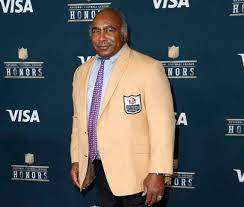A Super Bowl champion, Lanier won the NFL Man of the Year in 1972. He was selected to both the NFL’s 75th and 100th Anniversary All-Time Teams, and inducted into the Pro Football Hall of Fame in 1986 and the College Football Hall of Fame in 2000.
On January 15, 1967, the Chiefs lost Super Bowl I to Vince Lombardi's Green Bay Packers by a 35-10 score, forcing head coach Hank Stram to look for defensive players in the upcoming draft. Stram picked the 6’ 1”, 245 lb. Lanier with the 50th overall pick, three picks after another linebacker, Jim Lynch of the Notre Dame Fighting Irish.
Lynch had been chosen to play in the annual College All-Star Game, causing him to miss the first two weeks of Chiefs practice. By the time Lynch made it to camp, Lanier had already established himself as the team's middle linebacker. He joined Garland Boyette of the AFL's Houston Oilers as the first black middle linebackers in professional American football history. In the midst of a solid first season, Lanier suffered an injury and missed the last four games of the year.The following year, Lanier collected four interceptions, then matched that total in 1969 as he helped the Chiefs capture Super Bowl IV with a 23-7 upset of the Minnesota Vikings. He was stellar in the Super Bowl, recording 7 tackles and an interception. He later commented on the increased motivation that Chiefs players felt because of wearing an AFL patch to honor the league's final year.
There were numerous great moments throughout Lanier’s career, but none exemplifies his heart and desire as much as the Chiefs' goal line stand against the New York Jets in the 1969 divisional playoff game. Trailing 6-3 in the fourth quarter, New York had a first-and-goal at the Chiefs' one-yard line after a pass interference call on Kansas City. It was then that Lanier made an emotional appeal to the rest of the Chiefs defense, yelling: "They're not going to score...! They're not going to score!" The Chiefs shut down the Jets on three straight plays and held them to a field goal. Kansas City scored a touchdown on its next possession, winning the game, and winning a place in the Super Bowl.
The Chiefs reached the NFL playoffs only one more time during Lanier's career, in 1971, winning the AFC Western Division title. On Christmas Day, in the final contest at Municipal Stadium, the Chiefs' season came to an end against the Miami Dolphins in a double overtime classic. The contest was the longest game in NFL history, clocking in at more than 82 minutes.
In 1972, the Chiefs moved to Arrowhead Stadium. By 1974 the team's talent was depleted by age and injuries. After the conclusion of that season, Stram was fired after 15 years at the helm.
The linebacking trio of Lanier, Lynch and fellow Hall of Famer Bobby Bell is recognized as one of the most talented in professional football history, lasting until the arrival of new head coach Paul Wiggin in 1975.
Lanier was traded in April 1978 to the Baltimore Colts, but announced his retirement as an active player three months later on July 20, 1978.
After Lanier's retirement, the Chiefs retired Lanier's number.
Lanier returned to school, taking graduate courses at the University of Missouri–Kansas City. He then returned to Virginia as a stockbroker, at First Union Securities, where he served as vice-chairman. He is the former CEO of TDS/US, the minority venture partner of TDS Logistics (now Syncreon).
In 2006, Lanier was interviewed for the NFL Network documentary America's Game: The Super Bowl Champions chronicling the 1969 Kansas City Chiefs season.
In 1974, Lanier starred in The Black Six as Tommy Bunka. The move, which was directed by Matt Cimber (Matteo Ottaviano), was about racism in a southern town, with six black bikers (The Black Six) avenging the death of a friend. Lanier teamed with other 1970s players including (Joe Greene, Carl Eller, Gene Washington, Mercury Morris).




No comments:
Post a Comment